- Home
- Priscilla Royal
A Killing Season mm-8 Page 2
A Killing Season mm-8 Read online
Page 2
“He could not have been much more than a child when his father left.”
“That child is now a man. He still whines.”
Eleanor playfully swatted her brother’s arm. “He was rude enough to you. I have known boars to show more courtesy to their hunters, but you did provoke him.”
“You cannot excuse his boorish behavior for that reason. He may be trying to grow a man’s beard, sister, but he is nothing like his father.” Hugh made a point of rubbing the place his sister touched as if she had hurt him, then laughed. “Men are flawed creatures, sometimes cruel and often ill-mannered, yet we must all exhibit courage and restraint. A few have learned the lesson so well they have become saints.”
A log burst in the fireplace. Sparks flew like shooting stars.
Eleanor stepped back a safe distance from the hearth. “Unless God performs a miracle, Raoul will not be one of them.” She looked up at her brother with an amused expression. “I do not defend him. He lacked all sympathy for his parents, cared little enough about the deaths of his brothers, and suggested that taking vows was much like establishing his proper place near the salt at table.” She hesitated. “The only one to whom he bestowed a meager compliment was a man he called Leonel. Do I correctly remember the man’s name? Raoul called him cousin.”
“Even Raoul could find little for which to fault Sir Leonel. The man is Baron Herbert’s nephew, son of a brother who died many years ago. The baron and his wife gave a home to the boy and his mother, a woman who sorrowed so much over her dead husband that she soon sickened and died. I know the nephew. Leonel accompanied the baron to Outremer and showed such bravery that he was knighted.”
“This man finds favor with you?”
“On Herbert’s behalf, many of us grieved that Leonel was not his heir.”
Nodding, the prioress fell silent and watched as her brother’s thoughts seemed to drift away. “Do you not like any of the baron’s sons?” Her voice was soft.
He blinked as if she had just shaken him out of a dream. “Baron Herbert must have been born with a sword in his hand. He never turned his back on danger and inspired greater courage in all of us during battle. Should it surprise that he expected sons of equal merit? Aye, he was disappointed in his offspring. The first, however, was a good steward of the land, and his father was content to give at least one to the Church, saying that the family needed a holy man to pray for their souls. As for the second who just fell to his death, the third who drowned, and the fourth, now hiding in the family chapel, he never spoke much about them. I’ve told you what he said about Raoul.”
Hugh rubbed his hands and walked to the table where he considered pouring another mazer of wine. “In truth, I knew none of them well,” he said. Deciding he would drink no more, he faced his sister. “What cause had I to doubt the baron’s judgement on his own children?”
“Why take his nephew with him to Outremer? Surely he would have been happier bringing one of his sons? Were they disinclined to war, they still would have understood the service to God in reclaiming Jerusalem. Even the one bound for the Church would agree, although he might have chosen not to wield a sword.” Eleanor knew that bishops had often used maces to avoid the prohibition against shedding blood when they decided to go into battle. The fine distinction between mace and sword had always escaped her.
“Leonel was the best choice for more than one reason. The nephew inherited nothing from his own father, a man most imprudent and cursed with foolish vices. What land he owned as the second son was sold by Baron Herbert to pay off gaming debts. The babe and mother would have starved, had the uncle been a less honorable man. With five sons of his own and those debts to clear, he had nothing to give his nephew except horse and armor. He hoped Leonel would acquire enough wealth for himself in Outremer.”
“And the baron’s sons were content to stay in England, rejecting the glory of taking the cross?”
“The eldest did complain, but his father refused his request. He trusted him to guard all he possessed, then accepted the plea of the second-born to remain in England as well. The other three were too young to go. Since the eldest died of a mortal fever, Herbert was wise to leave two sons of mature years to safeguard his lands. As we all learned, a crusader’s lands may have been placed under God’s protection by Rome, but men do not always honor God’s will. Too many men who took the cross came home to nothing.” He shook his head. “Apart from the eldest, only Raoul demanded to go with his father.”
“Raoul?”
“Puppy that he was, he whimpered and moaned. When Herbert wearied of the noise, he stood the boy on a table in front of witnesses, stripped him, and felt between his legs. The baron declared the lad still a babe and sent Raoul off to find his mother, wailing like a newborn.”
A cruel story, Eleanor thought, and noted that her brother’s expression revealed no joy in the tale either. When Hugh’s own son, Richard, came to him in like manner and begged to be taken on the voyage with Lord Edward, her brother denied the child’s request with gentle words and then convinced him he would be a braver boy for staying home.
In the firelight, Hugh’s face was grey with fatigue.
“It is late,” Eleanor said. “Sister Anne has long since sought our quarters to rest. I should join her.”
Hugh took her hand and kissed it. “I must seek my own bed as well. Ask your good nun to pray for me, sweet sister.” Then he vanished into the corridor to find the winding staircase leading to the chambers above.
Eleanor’s own eyes grew heavy with weariness. As she walked through the windy corridor, the stone floor damp from the storm, she wondered how troubled her dreams would be in this place so devoid of peace.
Chapter Three
Baron Herbert looked down at the bloody corpse. Was there anything in the mess of battered flesh he still recognized as his second child?
Squeezing his eyes shut, he tried to remember all that this hollow shell had once been, and, although his heart screamed in agony, his eyes remained dry, refusing to grieve. He opened them and reached out to caress his son’s twisted neck. His fingers touched skin, but he felt nothing.
“Of course I would not,” he whispered, turning his callused palm upward. “This is not my son, only inanimate clay.”
He knelt by the body and took a deep breath. The odor of death was little different from that of a slaughtered deer.
Rage filled him. Like a possessed man, he began to pound the stone floor until his hands bled. “This is still my boy,” he roared, then stared at his torn fists.
Death, violent and irreverent, was well-known to him. In war he had seen countless dead bodies: some slaughtered in combat, others in villages by soldiers still crazed with battle frenzy. He watched as men were burned to charcoal, screaming for their mothers, and walked past bodies of women raped with spears while their wailing babies were smashed against walls.
Many of these were infidels, for whom he felt no sorrow. Their death agonies were paltry aches compared to what their benighted souls would suffer in the eternal flames of Hell.
Others were known to him, men with whom he had shared wine before battle or a fire on a bitter night. For these, he felt a prick of grief, yet any sadness was offset by the knowledge that their souls were in Heaven, freed of worldly imperfections or any care.
“But this is my flesh and blood, made with my seed,” he wailed, shaking his fist at God. “My son!”
Slowly he reached up and touched the torn clothing that covered the corpse.
“Nothing,” he whispered. “Nothing.”
In utter despair, he bent double and howled like a wolf under the full moon.
***
A woman stepped back from the chapel’s open door. For a moment she stood, eyes raised, and listened to her lord husband’s wild keening.
Then Lady Margaret turned her back and walked slowly away.
Chapter Four
The wind bit like a nipping dog, but the morning sun struggled to bring warmth, albeit wit
h a feeble touch. The scudding clouds, a mix of white and dark, promised uncertain weather.
Brother Thomas grasped his thick cloak and pulled it closer, then bent forward to look down into the cove through one of the crenels along the curtain wall near the entry gate. “I am glad we were surrounded by mist when we arrived yesterday,” he said, gazing at the narrow path leading to the drawbridge.
The cliffs on either side of the road were steep and bristled with sharp rocks. Watching the surf batter at the narrow promontory, he believed it was a miracle that even that vestige of land-bridge remained between mainland and island. Not that it would be long before the castle was irrevocably separated, he concluded. The edge of pale rock against which the drawbridge rested looked precarious, although the castle itself was settled on very solid ground.
Growing numb with the cold, he walked on, keeping close to the stone wall to avoid the full force of the wind. When he reached the protective mass of the watchtower, he paused and looked down again.
Now that the storm had abated, he could see that the cove was a rounded bay, protected from the full might of gales. There was even a sandy beach. In the summer, fishermen’s boats might be dragged up on shore to keep them safe, he thought, although the dark markings on the cliffs suggested that very high tides would render that impossible on occasion. Looking more carefully, he saw the boiling of riptides.
“No wonder the place is called Lucifer’s Cauldron,” he muttered. “There may be safety from the winds, but the incoming tides must be fierce.”
Perhaps fishermen did work along the coast in the milder seasons, he thought. When the castle was finally separated from the mainland by too great a distance for a drawbridge, provisions could be brought in by boat. For a moment, he amused himself by trying to imagine how supplies might be lifted from the bay before deciding there must be some location on the island that would prove better suited.
In this weather, he had no wish to seek it out.
A wind gust whipped around the tower and struck the monk with such force that he momentarily lost his balance. Reaching out for the wall, Thomas righted himself and then scurried toward the wide, stone staircase leading to the courtyard below. As he descended the stairs, he was passed by soldiers on their way up to take a turn on watch. He pitied them on such a bitter day.
Emerging into the bustle of castle life in the bailey, he was grateful for that comparative warmth provided by humans and animals crowded together. As he walked back to the keep, he avoided the thickest mud, mixed with manure from the various herds of long-horned goats, grunting swine, and lean-sided cows.
Briefly, he stopped to talk with a man mending a harness. Although the fellow’s fingers were red and swollen with the cold, he owned a cheerful disposition and was eager for a bit of idle chat.
When Thomas finally reached the stairs to the keep entrance, he felt a sharp pain and stopped to look at his hand. The palm was scraped from his fall against the stone wall. He shrugged. A little blood, but the wound was minor-unlike what that poor man suffered yesterday, falling from the high window.
Thomas shuddered with sympathetic terror.
He gazed up at the walls of the baron’s residence. Tilting his head, he studied the few narrow windows of the keep. How had the man fallen?
Whoever had built this fortress understood the coastal storms, as well as defensive concerns, and considered both in the design of those windows. The worst winds might drive mist, snow, and rain into the corridors of the upper halls, but the narrow windows were mostly on the leeward side, and the outer curtain walls gave the keep some additional protection. Those walls were also several feet thick.
With the thickness of the stone, the small openings and the position of the windows, Thomas could not imagine how any wind had caused the man to lose his balance. Even if he had slipped on the wet stone floor, the windows were at least waist-high. Considering all, it would be very difficult for a conscious, healthy man to accidentally tumble through the openings to his death.
Thomas knew the man might have jumped. No one had suggested such a thing when they took him to the corpse, laid out in the chapel, and asked that he do all he could for the man’s soul. If the family had suspected self-murder, none would have dared to mislead a priest about such a matter. God would know the truth. Fearful for their own souls, few would risk a lie.
Or the man could have been pushed.
Thomas hesitated, shocked at his reaction to this possibility. He ought to be distressed that the man might have been murdered. Indeed he was. He was also intrigued.
“I should be ashamed,” he muttered.
He wasn’t.
“If I long so for violence, perhaps I ought to have gone to Outremer as a soldier on pilgrimage to wrest Jerusalem from Muslim hands or become a mercenary. I am no peaceful servant of God,” he whispered to the wind, but he knew he had never truly yearned for horse and armor.
Not once had he ever wished to kill others for glory, profit, or even to serve God. If he hadn’t been caught in bed with Giles, he might have been content to remain a clerk to some high-ranking churchman.
He shook his head at that option as well. If he had stayed a clerk in minor orders, he would have become quite dull-witted with boredom. Instead, he had been forced to take monastic vows and was sent to the remote priory of Tyndal where he found himself in service to a woman. No man rejoiced at the chance to bring God’s justice to those who murdered more than Prioress Eleanor of Tyndal, a tiny woman who never let Thomas’ wits grow fat for want of exercise. Few other liege lords could have filled his life with quite so much adventure.
He smiled. “Since I am in her holy service, perhaps I need not rebuke myself too much,” he said, lowering his gaze to the muddy steps, “yet I should assume the baron’s son fell by accident and be prepared to offer what consolation I can to the family. Surely, this is what my prioress will send me to do.”
Holding firmly to that thought, he entered the keep and climbed the steep, curved stairway to his small room. Once the chamber of the family priest, recently deceased, it was near the small chapel where the current heir cowered for protection near the altar. Knowing the frightened Umfrey would appreciate soothing words, Thomas decided to go to the man after the next Office.
As he opened the door to his guest quarters, Thomas looked back over his shoulder and down the dark, narrow corridor that led to the family chapel. Despite good intentions to set thoughts of murder aside, he could not easily shake his doubts that any man could have fallen from those windows without assistance.
Chapter Five
Prioress Eleanor stood in the doorway of Lady Margaret’s chambers.
The shutters had been opened for light, letting in the brisk sea air, and a fire crackled in the small fireplace. Although the burning wood struggled valiantly, it only just succeeded in blunting the chill. As for the welcomed light, that was a pallid guest.
“Please,” Lady Margaret said and, with courtesy, invited her visitor to a place near the hearth. “There is Ypocras to drink for warmth and health.” While the white-haired servant heated the proffered mulled wine, Herbert’s wife fell silent and turned with an absent gaze to the window.
The lady has a hardened face, Eleanor decided as she accepted the cup. A sparkling glance or merry laugh might have softened the sharp bones and hollow cheeks, thin nose and narrow mouth, but there was no evidence that joy was common, at least not in recent times.
Yet the high forehead, silken skin, and blue eyes suggested Lady Margaret had once possessed beauty enough. Eleanor wondered when it had vanished. As Sister Beatrice once told her, youth wraps most young women with beguiling loveliness, which then flees after the first babe is born. Since Lady Margaret had borne her husband many sons, the allure must have faded only with the baron’s departure for Outremer. Try as she might, Eleanor could not name any by-blows sired by him, at least none known in England.
Eleanor winced at the injustice of her observation. The day after a son’s sudde
n death was not the time to seek joy or beauty in any mother’s face. Grief equally scarred hearts and brows with scouring ash. Recalling Raoul’s callous indifference to his brother’s death, the prioress found herself relieved that sorrow had at least touched the mother.
Lady Margaret turned back to face her guest, her eyes unfocused. She blinked as if surprised to see this stranger so near, then cleared her throat with embarrassment. “Forgive my discourtesy. I was distracted.”
The aged maid offered her mistress a cup of mulled wine. The lady accepted it, cradled the cup in her hands, and stared at the steaming liquid as if demanding the drink dispel her living nightmare. When it surely refused, her brow furrowed.
“Our arrival was sadly ill-timed,” Eleanor said. “If speaking of your grief would bring ease, my ears are your servants. I bear God’s comfort.”
Shutting her eyes, the lady bit her lips as she fought against emotion, but tears defied her will.
The prioress bowed her head in sympathy and waited for Margaret to speak.
“Then tell me the reason God has chosen to curse me. I bore all my sons in agony. That is a woman’s affliction, and I never complained of it. Instead, I rejoiced that I had given my husband so many strong boys. Most women are not so fortunate.”
Eleanor nodded and sipped her wine.
“Why now must I watch my sons die? God burdens me with more pain than Eve ever suffered, and she committed the greatest sin.” Margaret raised her reddened eyes and stared at the wood-beamed ceiling.
Eleanor said nothing, knowing the lady was not finished.
“Our five sons stood at my side when my lord knelt at the bishop’s feet and took the cross.” She gestured toward the chamber window. “We stood on those very walls and watched him ride away with his banners and his knights, proud to precede the Lord Edward in Outremer.”

 The Twice-Hanged Man
The Twice-Hanged Man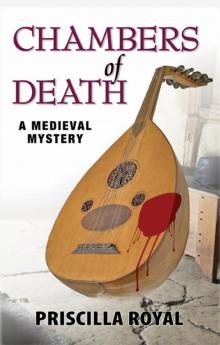 Chambers of Death mm-6
Chambers of Death mm-6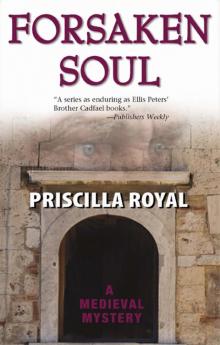 Forsaken Soul
Forsaken Soul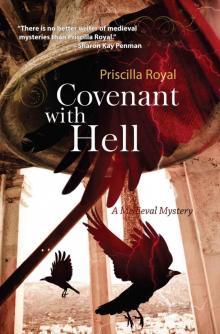 Covenant With Hell (Medieval Mysteries)
Covenant With Hell (Medieval Mysteries)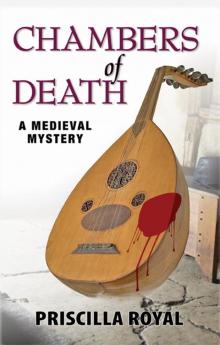 Chambers of Death
Chambers of Death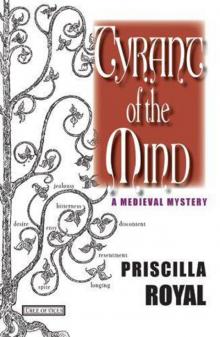 Tyrant of the Mind
Tyrant of the Mind Wild Justice
Wild Justice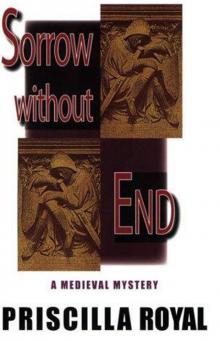 Sorrow Without End
Sorrow Without End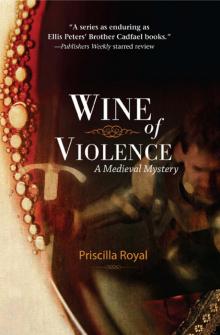 Wine of Violence
Wine of Violence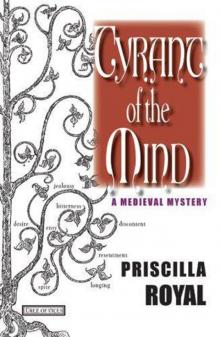 Tyrant of the Mind mm-2
Tyrant of the Mind mm-2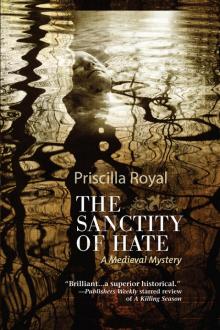 The Sanctity of Hate
The Sanctity of Hate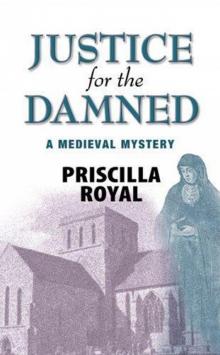 Justice for the Damned
Justice for the Damned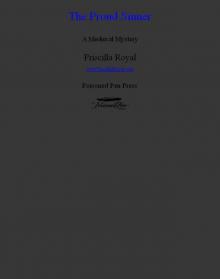 The Proud Sinner
The Proud Sinner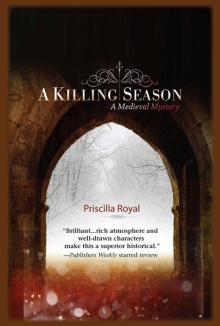 A Killing Season mm-8
A Killing Season mm-8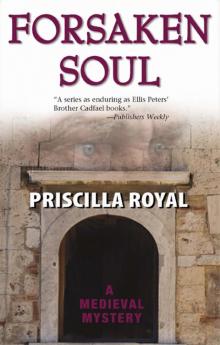 Forsaken Soul mm-5
Forsaken Soul mm-5 Valley of Dry Bones mm-7
Valley of Dry Bones mm-7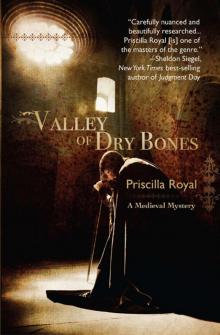 Valley of Dry Bones
Valley of Dry Bones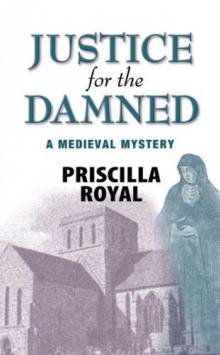 Justice for the Damned mm-4
Justice for the Damned mm-4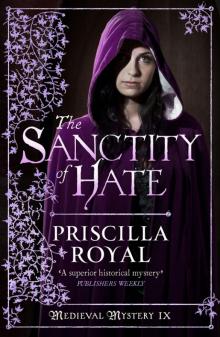 Sanctity of Hate
Sanctity of Hate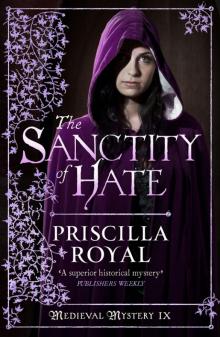 Sanctity of Hate mm-9
Sanctity of Hate mm-9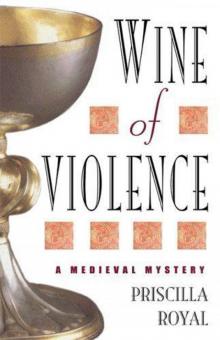 Wine of Violence mm-1
Wine of Violence mm-1